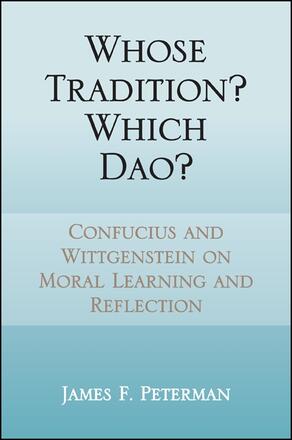
Whose Tradition? Which Dao?
Confucius and Wittgenstein on Moral Learning and Reflection
Alternative formats available from:
Considers the notable similarities between the thought of Confucius and Wittgenstein.
Description
In an incisive work of comparative philosophy, James F. Peterman considers the similarities between early Chinese ethicist Confucius and mid-twentieth century philosopher Ludwig Wittgenstein. Their enduring legacies rest in no small part on projects to restore humanity to healthy ways of living and thinking. Confucius offers a method of answering ethical questions designed to get his interlocutors further along on the Dao, the path of right living. Struggling with his own forms of unhealthy philosophical confusion, Wittgenstein provides a method of philosophical therapy designed to help one come into agreement with norms embedded in our forms of life and speech. Highlighting similarities between the two philosophers, Peterman shows how Wittgensteinian critique can benefit from Confucian inquiry and how Confucian practice can benefit from Wittgensteinian investigations. Furthermore, in presenting a way to understand Confucius's Dao as concrete language games and forms of life, and Wittgenstein's therapeutic interventions as the most fitting philosophical orientation toward early Confucian ethics, Peterman offers Western thinkers a new, sophisticated understanding of Confucius as a philosopher.
James F. Peterman is Professor of Philosophy and Director of Community Engagement at Sewanee: The University of the South. He is the author of Philosophy as Therapy: An Interpretation and Defense of Wittgenstein's Later Philosophical Project, also published by SUNY Press.
Reviews
"…rich in detailed insights into the exegesis of the Analects. " — Religious Studies Review
"Peterman has written a pioneering book, one that usefully compares Confucius and Wittgenstein … Anyone interested in Confucius, Wittgenstein, or comparative philosophy will benefit from this book. " — Dao
"I cannot but highly recommend this work to all those interested in the analysis and understanding of the project of morality. To be sure, it will challenge those unfamiliar with Confucius or Wittgenstein, but the resulting benefits will be well worth the effort. Peterman is a very careful philosopher … I consider this book an important example of philosophical work which does justice to both Confucius and Wittgenstein while advancing philosophical reflection beyond a mere comparison. " — Ronnie Littlejohn, Notre Dame Philosophical Reviews